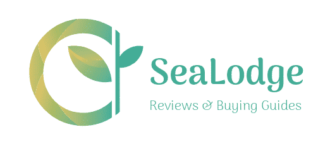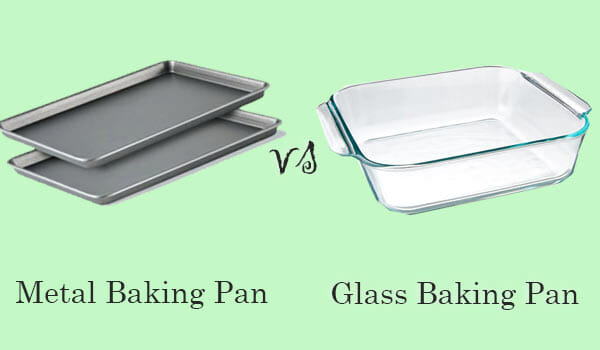Whether you are a professional or someone who loves to bake occasionally, it's difficult to choose between a glass or metal baking pan. As you know, the material of your baking pan is directly responsible for the quality of your baked goods.
Now then, which one is better between glass or metal baking pan? Well, the answer is variable. Both metal and glass baking pans have their advantages and disadvantages. So, the choice depends on what you are baking.
A bit confusing, right? Don't worry; I'll discuss about glass vs metal baking pans in detail and show you when to use which baking pan.
What Is a Metal Baking Pan?
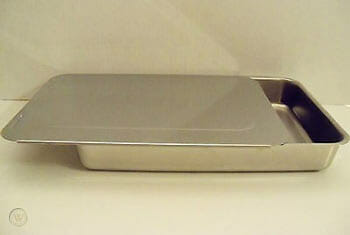
As obvious as it sounds, a metal baking pan is constructed from either cast iron or stainless steel. These baking pans usually come in pitch black with a dull or matte finish and light color with a shiny or reflective finish.
Even the color of your metal baking pan plays a big role in baking your goods perfectly. Depending on its costs, you might also get a non-stick surface coating.
The non-stick coating is formulated from food-safe chemicals, which are applied directly to the surface of the baking pan.
Even if those chemicals are "food-safe," there are some things you have to take into account, such as refraining from using extremely high temperatures while baking.
Advantages of Using a Metal Baking pan
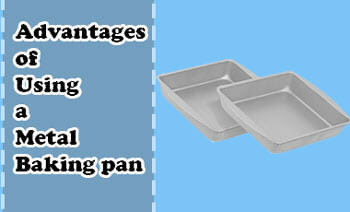
One of the biggest advantages a metal baking pan has over glass is the capability of heat conduction. As we all know, metal is a great conductor of heat, which means metal heats up quicker than glass.
Remember when I said color plays a big role in baking your goods? Metal baking pans with dark colors can absorb heat faster, saving your time.
On the other hand, the shiny light-colored pans retain heat less efficiently but give you a balanced result. Even professionals prefer shiny ones.
Regardless of the color you choose, metal pans will outperform glass in heating up. Using metal baking pans will reduce the baking time to the bare minimum.
Lastly, metal pans lose heat as fast as they retain it. This means they are perfect for baking items you want to eat as soon as you take them out of the oven.
Disadvantages of Using a Metal Baking Pan
The main problem with metal baking pans is they react with acidic foods. If your item contains acidic elements (fruit cakes), the pan will react with the item and cause discoloration. It can sometimes even alter the taste.
Another disadvantage of using metal baking pans is the application of non-stick surface coatings. Because the coatings are mainly chemical-based, they can potentially leak toxins at higher temperatures.
Yes, I know the brands advertise their metal pans as safe, but there is always a chance of releasing toxins.
What Is a Glass Baking Pan?
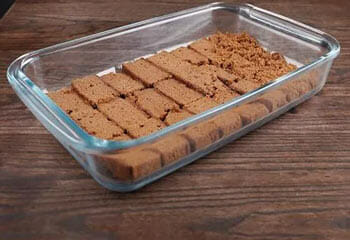
Metal and glass baking pans serve the same purpose: to bake your delicious cakes or brownies the way you want.
Unlike metal pans, where you can choose from two different materials (cast iron or stainless steel), glass baking pans are always made of pure glass (obviously).
Another thing, all the glass baking pans are transparent or semi-transparent. So, you don't have the option to choose colors.
In contrast to metal baking pans, glass pans do not have any non-stick chemical surface coating because glass, by nature, is non-stick.
Advantages of Using a Glass Baking Pan
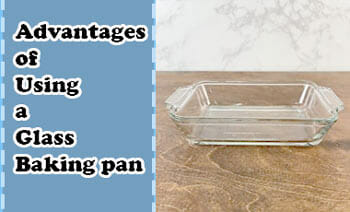
Unlike metal, glass is not a good heat conductor, and that's exactly why it is an excellent choice for baking. Glass baking pans can retain heat much longer. This means your food will continue to bake at a constant temperature even if the oven's temperature drops.
Glass baking pans are also great for serving, mixing and storing as your food will stay warm even after taking them out of the oven.
As I said earlier, glass is naturally non-sticky. Thus, there is no need to put any non-stick coating on the surface. No chemical involvement means the glass is 100% safe.
Thanks to glass transparency, the biggest advantage is that you can check whether a portion of your food is overcooked or undercooked.
Disadvantages of Using a Glass Baking Pan
Glass baking pans can't withstand very high temperatures and are likely to shatter or crack under such temperatures.
Apart from this, they are also prone to cracking or shattering if there's a sudden fluctuation in temperature.
For example, if you take out the pan from the oven and put it on a cold surface or vice-versa, it will crack or break.
Glass Loaf Pan vs Metal Baking Pan - What Are The Actual Differences?
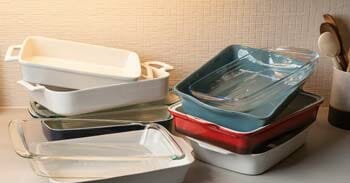
Putting aside all the advantages and disadvantages, you can use both of these baking pans to bake mouth-watering food. Yes, the outcome may vary slightly, but you get the idea.
But if you are still wondering what characteristics set these baking pans apart, I got your back.
Appearance
The first and the most obvious thing you'll notice is the visual difference between glass and metal baking pans. Metal baking pans come in black or shiny colors. You can only monitor the top side of your food as metal pans are not transparent.
On the other hand, glass baking pans are transparent or semi-transparent. This means you can monitor your food from every side, giving you hints if anything is burning or not.
Both black metal and glass pans burn hotter than light metal baking pans. This is why you need to turn the oven down to 25C, or it will burn your food.
Baking Time
There's a popular myth regarding metal. People think that metal pans bake food faster because it heats up fast. That's not true. In fact, glass baking pans may heat up slowly, but they bake faster. I know it seems odd.
Although metal bakes slower, you get an even heat distribution throughout the entire surface. If you prefer browning, metal is the way to go.
Surface
Naturally, metal does not have any non-stick coating. This is why you have to add it manually. Don't be alarmed as these chemicals are safe. Of course, you have to follow the manufacturer's instructions for proper safety.
As glass is virtually non-porous, no food sticks to the surface. As a result, you can clean the glass easily compared to metal pans.
Compatible Foods
As metal baking pans heat up quickly, I suggest baking foods that won't be inside the oven for long. Metal pan is also great for baking brownies, muffins, bars, and chocolate cakes as it provides a browning effect.
As metal can react with acidic foods, you can stick to glass pans when baking fruity items. If you are a beginner, glass is also great for pies. In short, you can bake anything non-acidic on metal pans.
Temperature Transition
A glass pan is not suitable if you want to bake something out of a freezer. This sudden transition from cool (or moderately cool) to hot temperature will surely shatter or crack the glass.
On the other hand, metal baking pans can handle temperature fluctuations or transitions nicely. So, make sure you get a metal pan in such situations.
Final Words
Although metal and glass baking pans do the same thing, they have significantly different features and attributes. From appearance to the body to functionality, these differences make them special.
If we are talking about which one is the winner between metal vs. glass baking pan, I'd say it comes down to your preference. Hopefully, my comparison gives you a clear idea of which one to choose.
Related article:
SeaRanchLodge.com is a participant in the Amazon Associate program and will earn from qualifying purchases.
